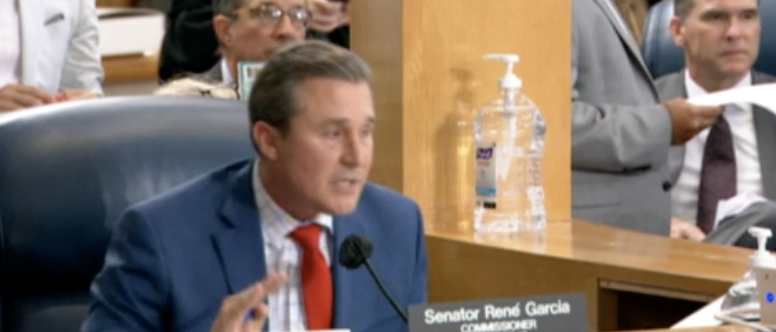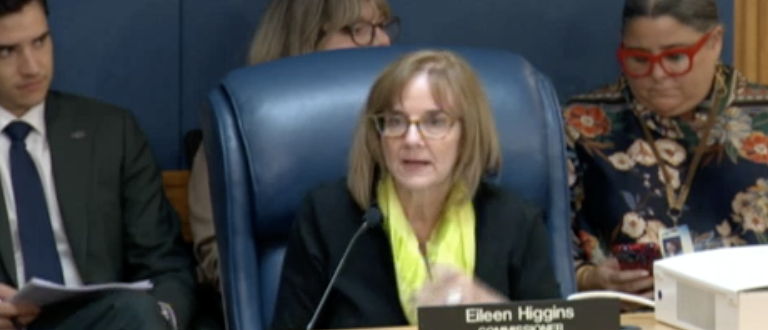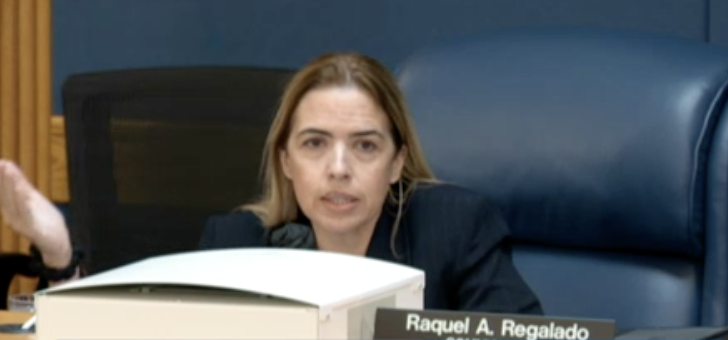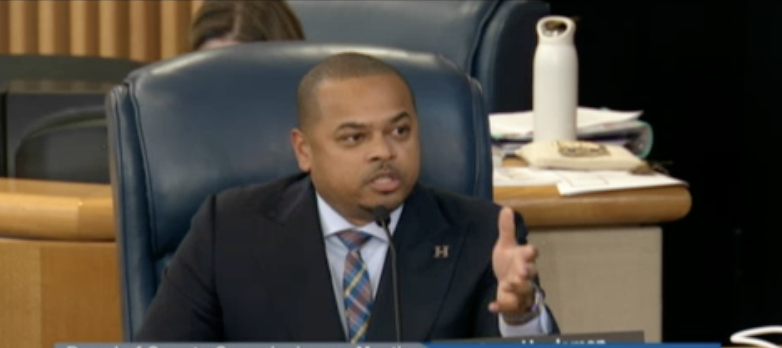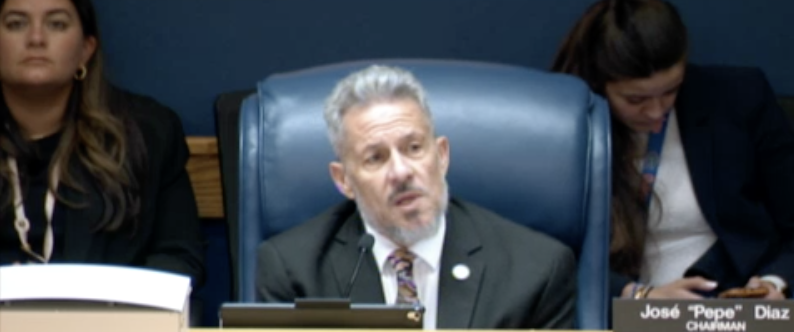But county ‘ambassadors’ program with $25K stipends was killed
Ka-ching!
Right after denying property owners an additional percentage or two in a tax break, Miami-Dade Commissioners on Tuesday approved a budget that more than doubles their compensation to a whopping $138,000 a year in a sneaky move that took many — including commissioners — by surprise.
Nobody knew about the compensation increases, which weren’t discussed during the first budget hearing earlier this month. It wasn’t in the mayor’s budget message and it wasn’t brought up in meetings with commissioners.
Did Mayor Daniella Levine Cava put that in there to basically bribe commissioners to vote for her budget?
Currently, commissioners make $6,000 in annual salary but it grows to $60,000 in total compensation when you include expenses, a car allowance and executive and retirement benefits. The new budget increases their expense account from $24,000 to $43,000, an increase in car allowance from $9,600 to $10,500 and an increase in executive benefits — intended to be used for health insurance, according to Commission Policy and Budget Director Jennifer Moon — from $10,000 to $18,000.
The biggest jump was in the county contribution to the 401a account, which is a retirement or 401k for government officials. It goes from a cap of $11,500 to a cap of $61,000. That’s more than a 500% increase.
Commissioner Raquel Regalado tried to have that retirement cap remain at $11,500, but that motion failed for lack of a second.
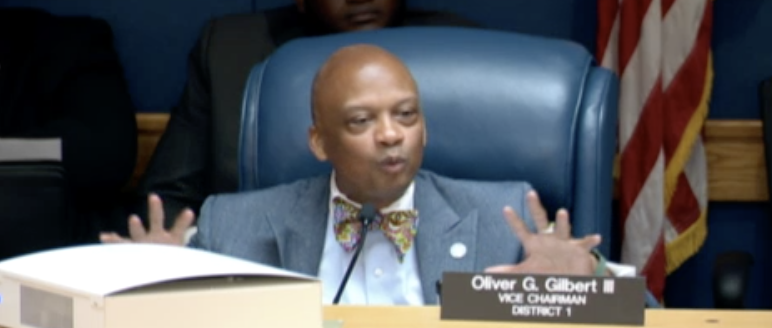
Commissioner Oliver Gilbert was the thirstiest fan of both the increased compensation and the county “ambassadors” program, which was killed, even after he changed the title to “post service supplement program,” and said it was just to make former commissioners whole in their retirement because their salaries have been so small.
Even with changes that limited the number of years an ex commissioner could get and the number of commissioners eligible, the crazy “ambassadors” program did not get enough support. It died in a 7-5 vote. Only Gilbert, Keon Hardemon, Kionne McGhee, Jean Monestime and Javier Souto supported it.
Read related: Miami-Dade passes $10B budget w/ tiny tax ‘cut’ and shady ‘ambassadors’ fund
He lost that fight, but battled hardest for the compensation increases.
“This isn’t salary. These are expense accounts,” Gilbert said, adding that contracts have escalator on prices “because we understand that a paperclip in year one won’t cost the same as year five.
“What I found is that we haven’t adjusted the expense account just for the consumer price index since at least 2000,” Gilbert added. “The same things that cost more for everybody else cost more for the people sitting on this dais.
“I appreciate my colleagues who have to vote no for political and pressure situations,” he said.
He sounded almost too thirsty. Maybe that’s because he doesn’t have another job and listed his net worth as negative $41,000 in his 2020 qualifying paperwork.
But most of the commissioners, if they aren’t retired like former Senator Javier Souto, have jobs.
According to their most recent financial disclosures:
- Rene Garcia gets $170,000 as a healthcare consultant and his net worth was listed as $240,000.
- Jean Monestime did not report any income from his real estate sales, but listed his net worth as $254,600.
- Sally Heyman reported making just over $5,000 as an expert witness in 2017, and listed her net worth as $526,000.
- Eileen Higgins reported a 2019 salary of just under $50,000 working at an accounting firm. She lists her net worth as $2.5 million.
- Rebeca Sosa made $84,000 as a teacher trainer for Miami-Dade Public Schools in 2017 and listed her net worth as $25,000
- Regalado makes $72,000 as an attorney and $60,000 as a radio host on Caracol. Her net worth was listed as $74,575.
- Kionne McGhee makes $90,000 a year as an attorney and listed his net worth at $92,357 on his 2020 qualifying documents.
- Danielle Cohen Higgins makes $310,000 a year as an attorney and listed her net worth on her financial disclosure as $1.8 million.
The budget passed in a 7-5 vote. Voting against it were Garcia, Heyman, Higgins, Regalado and Rebeca Sosa.
Cohen Higgins said that while she was campaigning, voters told her they couldn’t do the job for $6,000 a year. And there has been arguments that by raising the salaries, more people can run for office and there is less “temptation” to get unlawful compensation, as suspended Commissioner Joe Martinez is accused of.
Read related: Joe Martinez suspended hours before final budget hearing; no replacement
Commissioner Keon Hardemon — another attorney, net worth listed at $148,762 — also voiced support for the increased compensation. His financial disclosure shows he has no income as an attorney.
“If you vote against your interest, your children’s interest and the future interest of those who come to the dais, they’re all going to laugh at you,” said Hardemon, who made $105,000 a year when he was a city of Miami commissioner two years ago.
“The $6,000 is clearly not a fair wage. It’s insulting.”
Chairman Jose “Pepe” Diaz, who reported making $97,000 in 2018 as a consultant — and whose net worth grew from $89,373 in 2014 to $450,000 in 2018, according to his financial disclosures — reminded his colleagues that while voters must approve any salary increases, by charter, “benefits are up to us.”
And it is painfully obvious that this was exactly what the move was — an effort to bypass the will of the people, who have voted against salary increases 13 times since 1967, according to a 2017 charter review task force.
Maybe it’s because commissioners were too greedy. In 2012, the proposed increase on the ballot was from $6,000 a year to $92,000 a year. Of course voters scoffed. Why didn’t commissioners ask for a reasonable amount? Like maybe $45,000 or $50,000 or even $60,000 a year?
Instead, five years later, the charter review task force recommended a $100,000 salary. Commissioners knew better than to put that on the ballot.
If you like what you’re reading, please be aware that Ladra gets no salary or benefits, just a little bit of income from ads and the support from the community. You can support Political Cortadito and this kind of grassroots government watchdog journalism with a donation.
And no public dollars have been used to produce this blog.
The other thing is that this is not supposed to be a job. It is public service. Some commissioners, however, have made it a career by being there for decades. But they are supposed to be public servants who are also teachers, cops, attorneys, social workers, librarians, accountants, journalists, real estate agents, small business owners or whatever. You spend a few years — now term limits has it capped at eight — working to better the community and then leave it to someone else.
Read related: Miami commission approves $2.5B budget, tax break at Saturday hearing
This is public service, folks. It’s almost like volunteering.
Yeah, sure, commissioners in Palm Beach and Broward and even electeds in cities make more. And, yes, county commissioners spend a lot of hours at not just commission meetings but committee meetings and preparing for committee meetings and meeting with constituents and events in their district. But that’s what they signed up for.
Members of the county’s community councils — who can spend many hours reviewing and researching zoning applications and meet every month — don’t get any compensation for what they do. Because, again, it’s a public service.
Or, at least, it’s supposed to be.


